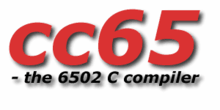cc65
cc65 is a cross development package for 65(C)02 systems, including a macro assembler, a C cross compiler, linker, librarian and several other tools.
 | |
| Developer(s) | Ullrich von Bassewitz |
|---|---|
| Initial release | April 26, 1999 (email list) May 28, 2000 (repository) |
| Stable release | 2.18
/ May 29, 2019 |
| Repository | |
| Written in | ANSI C |
| Operating system | Multiplatform |
| Type | Cross compiler |
| License | zlib license |
| Website | cc65 |
cc65 is based on a native C compiler that was originally adapted for the Atari 8-bit computers by John R. Dunning in 1989, which originated as a Small C descendant. It has several extensions, and some of the limits of the original Small C compiler are gone.
The toolkit has largely been expanded by Ullrich von Bassewitz and other contributors. The actual cc65 compiler, a complete set of binary tools (assembler, linker, etc.) and runtime library are under a license identical to zlib's.[1] The ca65 cross-assembler is one of the most powerful 6502 cross-assemblers available under an open-source license.
The compiler itself comes close to ANSI C compatibility, while C library features depend on the target platform's hardware. stdio is supported on many platforms, as is Borland-style conio.h screen handling. GEOS is also supported on the Commodore 64 and even the Apple II. The library supports many of the Commodore platforms (C64, C128, C16/116/Plus/4, P500 and 600/700 family), Apple II family, Atari 8-bit family, Oric Atmos, Nintendo Entertainment System, Watara Supervision game console and Ohio Scientific Challenger 1P.[2]
Officially supported host systems include Linux, Microsoft Windows, MS-DOS and OS/2, but the source code itself has been reported to work almost unmodified on many platforms beside these.
Supported API
static
- conio (text-based console I/O non-scrolling)
- dio (block-oriented disk I/O bypassing the file system)
dynamic
- em (expanded memory, used for all kinds of memory beyond the 6502's 64K barrier, similar EMS)
- joystick (relative input devices)
- mouse (absolute input devices)
- serial (communication)
- tgi (2D graphics primitives inspired by BGI)
| conio | dio | emd | joy | mou | ser | tgi | |
|---|---|---|---|---|---|---|---|
| apple2 | Yes | Yes | 1 | 1 | 1 | 1 | 2 |
| apple2enh | Yes | Yes | 1 | 1 | 1 | 1 | 2 |
| atari | Yes | Yes | 2 | 15[3] | |||
| atmos | Yes | 1 | |||||
| c16 | Yes | 1 | 1 | ||||
| c64 | Yes | 6 | 4 | 3 | 1 | 1 | |
| c128 | Yes | 5 | 2 | 3 | 1 | 2 | |
| cbm510 | Yes | 1 | 1 | 1 | |||
| cbm610 | Yes | 1 | 1 | ||||
| geos | Yes | Yes | 1 | 1 | 1 | ||
| lynx | 1 | 1 | 1 | ||||
| nes | Yes | 1 | |||||
| osi | Yes | ||||||
| pet | Yes | 1 | |||||
| plus4 | Yes | 1 | 1 | ||||
| supervision | |||||||
| vic20 | Yes | 2 |
Note: For static libraries, "Yes" means the feature is available. For dynamic libraries, the columns list the number of available drivers.
- https://github.com/cc65/cc65/commit/aeb849257277a6b98542de8579697b81c6dd70e6
- https://cc65.github.io/doc/osi.html
- By Fatih Aygün. CIRCLE doesn't work at all, some graphics modes may crash on some machines.